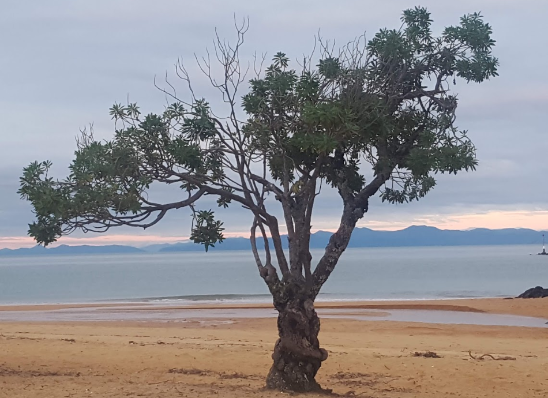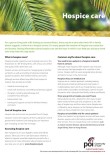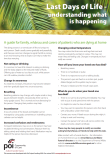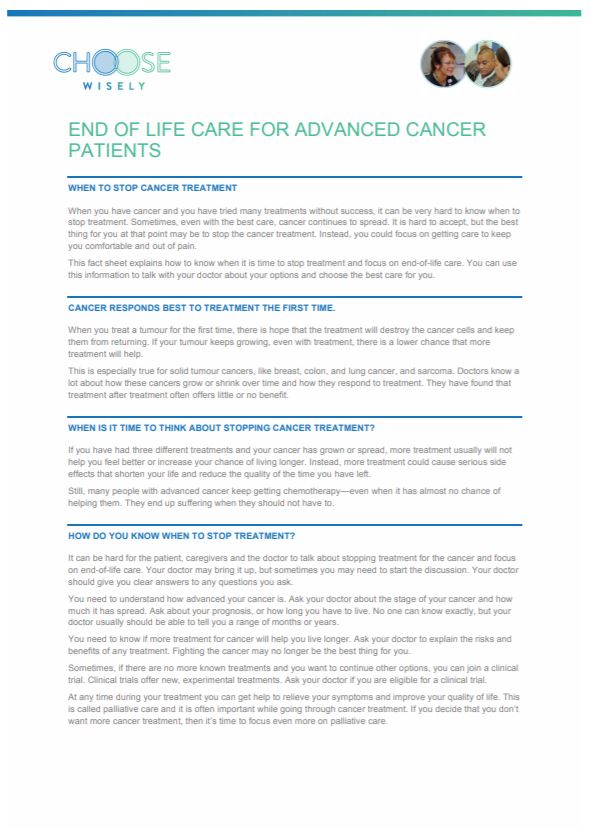Care in the last few days of life
Key points about the last few days of life
- Even when someone close to you is terminally ill, the last few days of their life can be unexpected.
- You may notice some changes physically and in their thinking that indicate they’re close to death.
- Everyone’s last few days of life are different, and it can be difficult to predict how and when someone will die.
- It can be helpful to recognise and understand changes that happen in the last few hours and days of life so you can continue to support your family member or friend who is dying.

It’s normal for people in their last few days of life to not have much of an appetite. Eventually people who are dying will stop eating and drinking. Although this can be distressing because eating and drinking are fundamental to our lives, it’s a normal part of the dying process. You can help to keep them comfortable by offering them small sips of water through a straw.
In a person’s final few days or hours they will spend more and more time asleep. They may wake up for periods during the day and night and be able to spend some time talking, or just being with you. You may find they’re drifting in and out of consciousness. They may not be able to communicate much with you, but that doesn’t mean they can’t hear what you’re saying. Spend time talking with them, play their favourite music or just sit and hold their hand.
During the dying process, a person’s breathing can become shallower, and there can be long pauses between each breath. They may not be able to swallow their secretions so their breathing may become noisier and sounds rattly. This is usually more distressing for people hearing it than for the person dying.
A person’s hands and feet can start to feel cold, and their skin can become pale and uneven in colour.
You may find they become agitated and confused; sometimes they might start to see and talk to people who aren’t there.
Your guide to hospice care(external link) Hospice NZ
What to expect when someone important to you is dying(external link) The National Council for Palliative Care, UK
Resources
Last days of life – understanding what is happening Palliative Outcome Initiative, NZ
Available in the following languages:Arabic, [PDF, 905 KB] Simplified Chinese, [PDF, 946 KB] Hindi, [PDF, 821 KB] Korean, [PDF, 963 KB] Samoan, [PDF, 1 MB] Tongan [PDF, 920 KB]
End of life care for advanced cancer patients(external link) Choosing Wisely, NZ
Hospice care. Palliative Outcome Initiative, NZ
Available in the following languages: Arabic [PDF, 921 KB], Simplified Chinese, [PDF, 813 KB] Cook Island Māori, [PDF, 885 KB] Hindi [PDF, 774 KB], Korean [PDF, 1.3 MB], te reo Māori [PDF, 992 KB], Samoan, [PDF, 965 KB] Tongan [PDF, 855 KB]
References
- Changes in the last hours and days(external link) NHS Choices(external link)
- Te Ara Whakapiri – principles and guidance for the last days of life(external link) Health New Zealand | Te Whatu Ora
Last days of life – recognising dying | Ngā rangi whakamutunga o te oranga – te kite i te matenga(external link) Health Quality & Safety Commission, NZ
Te ara whakapiri – principles and guidance for the last days of life(external link) Health NZ | Te Whatu Ora
Te ara whakapiri – toolkit [DOCX, 522 KB] Ministry of Health, NZ
Ongoing care of the dying person(external link) Hospice Waikato, NZ
Care during the last days of life Pairuri (palliative care)(external link) HQSC NZ
Recognising the dying person – flow chart(external link) Health NZ | Te Whatu Ora
Medical management planning - general principles(external link) Health NZ | Te Whatu Ora
Bereavement risk assessment tool [DOCX, 48 KB] Ministry of Health, NZ
Symptom management guidelines(external link) Health NZ | Te Whatu Ora
Discharge checklist(external link) Health NZ | Te Whatu Ora
When death approaches(external link) Health NZ | Te Whatu Ora
Dying at home(external link) Health NZ | Te Whatu Ora
Home care in the last days of life(external link) Health NZ | Te Whatu Ora
Serious illness conversation guide Aotearoa(external link) Health Quality & Safety Commission, NZ
Brochures

Hospice care. Palliative Outcome Initiative, NZ, 2020
Arabic & English, Simplified Chinese & English, Cook Island Māori & English, Hindi & English, Korean & English, te reo Māori & English, Samoan & English, Tongan & English

Palliative Outcome Initiative, NZ, 2020
English & Arabic, English & Simplified Chinese, English & Hindi, English & Korean, English & Samoan, English & Tongan

Choosing Wisely, NZ, 2016
Credits: Healthify editorial team. Healthify is brought to you by Health Navigator Charitable Trust.
Reviewed by: Dr Sara Rishworth, Palliative Care Specialist
Page last updated:





